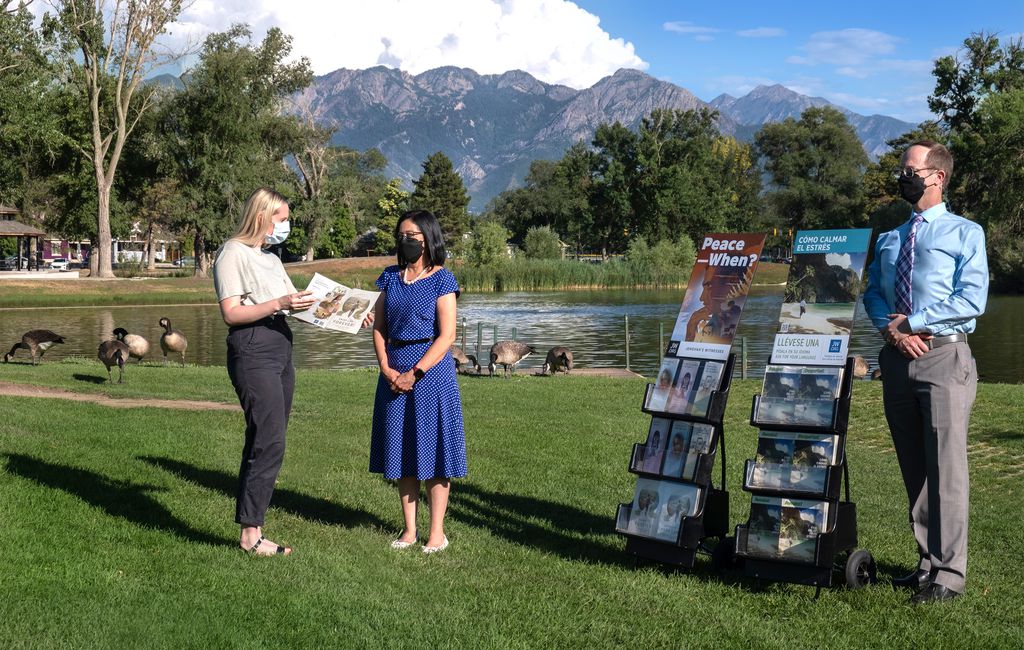“That’s what we do,” says faith’s spokesperson. As for Latter-day Saint missionaries, they have moved away from “tracting.”

Jehovah’s Witnesses have returned to in-person contacting. Here, Eugene and Katrina Hargrove spread the word at Salt Lake City’s Liberty Park.
Jehovah’s Witnesses across Utah dusted off their pamphlets last week and reclaimed their stations at prominent street corners as the faith resumed in-person ministering nationwide for the first time in more than two years.
Citing “respect for life and love of neighbor,” the Jehovah’s Witnesses, acting in response to the COVID-19 pandemic, officially suspended door-to-door contacting, literature displays in public spaces, and in-person worship services back in March 2020.
The shift was a dramatic one for a faith that, along with The Church of Jesus Christ of Latter-day Saints, is known for its extensive missionary efforts.
“To be a Jehovah’s Witness, you really need to continue to witness,” spokesperson Robert Hendriks explained. “That’s what we do. That’s why we’re called Jehovah’s Witnesses.”
Rather than put evangelizing on hold, believers pivoted to virtual Bible studies, phone calls and letter-writing.
“Millions of letters were sent,” Hendriks said, “perhaps even billions.”
Katrina and Eugene Hargrove were among those legions of letter writers. During the past two years, the Utah couple — who have been witnessing for 40 years — said they both felt the distance that comes with communicating over Zoom versus in person. Still, they found moments of meaningful connection.
“So many have responded with appreciation, thanking us for thinking about them during this time,” Katrina said. “I’m so excited to be able to see them again in person.”
The Hargroves cited a love for working in Utah, where they said people are generally respectful of their work.
“Many people are very comfortable with talking about God,” Eugene said. “So we find it very easy to talk to people here, and they enjoy hearing a good message out of the Bible.”
Hendriks seconded this point, specifically citing Latter-day Saints’ own “understanding of how challenging” public proselytizing can be as a boon to the work of Utah’s 8,000 Witnesses.
“The LDS folks, they have respect for Jehovah’s Witnesses,” he said. “They understand a little bit of what we do.”
(Courtesy photo) Jehovah’s Witnesses have returned to in-person contacting. Here, Jackie and Tony Lucas spread the word at Arches National Park.
Latter-day Saint missionaries also relied heavily on virtual communication during the height of the pandemic, although many returned to face-to-face meetings as vaccines got into arms and health restrictions began to lift.
Even before COVID-19, Latter-day Saint missionary efforts had been moving away from door-knocking, commonly called tracting, and toward new tactics, including the creation of faith-promoting content online. The pandemic accelerated those efforts, helped along by the younger generation’s web savvy.
“Sometimes we think of the internet and social media as an enemy because there can be so much negativity there,” apostle Dieter F. Uchtdorf, the former head of the church’s Missionary Executive Council, said in a message released in June 2020. “However, the internet can be a friend to us when we use it correctly.”
(Walk with Christ via YouTube) A screenshot from a music video shows missionaries from The Church of Jesus Christ of Latter-day Saints performing in North Dakota.
That’s not to say drivers should be surprised when they pass two clean-cut young men in shirts and ties on a bike. As David Weidman, managing director of the church’s Missionary Department, told The Salt Lake Tribune back in 2021, “in-person service, teaching and ministering is still a vital part of what missionaries do.”
“It’s not so much that we deemphasize door-to-door proselytizing,” he said, “but rather emphasize doing what is most effective in finding those who are searching for answers about life.”





